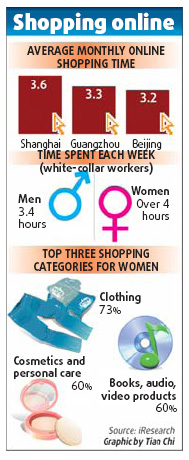Office workers lead charge into online stores
Chinese consumers are increasingly avoiding the high street and electing to seek out cheaper and better products online.
 It is a trend that is popular nationwide but young office workers in Shanghai are in the vanguard.
It is a trend that is popular nationwide but young office workers in Shanghai are in the vanguard.
In China's financial hub, white-collar workers make an average of four online purchases a month while their counterparts in Beijing and Guangzhou complete around three deals, according to a survey jointly conducted by cn.msn.com and the consultancy agency iResearch.
Digital products, cosmetics and fashion items are catching up in popularity with online favorites such as books and video offerings, according to the survey of more than 20,000 office workers.
Female white-collar workers are more likely than their male colleagues to buy over the Internet. The survey shows they spend an average of four hours visiting online stores each week. Men spend around 3.4 hours browsing Internet products.
Clothes, books and cosmetics are the most popular purchases among women, while men prefer digital items such as cameras and mobile phones.
"White-collar workers have become the backbone of the soaring online business in China and more importantly, they are willing to spend more," said Liu Shu, a senior manager with cn.msn.com.
She said the survey found that office workers with a monthly salary of more than 10,000 yuan ($1,460) were spending around 900 yuan each month on online products. Female office workers spend around 1,000 yuan a year on cosmetics alone.
Figures from iResearch show Chinese consumers bought 65.8 billion yuan of products through Internet stores during the third quarter of the year. That was up 90 percent on the same period last year.
Jiang Qiping, secretary-general of the Chinese Academy of Social Sciences' Information Technology Research Center, said e-business had grown to become an important platform to help spur domestic demand at a time when the financial crisis had left traditional shopping malls struggling with falling numbers of shoppers.
Convenience, cheaper prices and increased variety were the main reasons for the boom in online shopping, the survey said.
Scarlet Chen, a female worker at a Shanghai advertising company, became a keen online shopper while still in college.
"I love dressing well but my budget was tight back then. So I turned to our school's online bulletin system where new clothes were sold at second-hand prices," she said.
"Now I'm more affluent but I still like to buy from places like taobao.com because I have a lot more choice there," Chen said.
For Chen, seasonal and unusual items, such as moon cakes during the Mid-Autumn Festival and gauze masks for the H1N1 outbreak, jump out.
"In contrast with common moon cakes and medical gauze masks, you can find, through online shops, personalized cakes that can be engraved with consumers' names, or masks with cartoons or graffiti that cater to personality-oriented groups," she said.
However, online shopping is not worry-free.
The survey says many Internet store customers are concerned about being sold fake products, poor quality items and worry about the absence of after-sale service.
To better regulate the market, taobao.com, the most popular platform for online shopping in China, announced on Wednesday it was allocating 100 million yuan toward the fight against fake products.
The money will be used to compensate consumers and set up a professional anti-counterfeit team, the website said.
It said that since 2003, when the platform was established, it had closed 9,834 shops for selling fake products.
 0 Comments
0 Comments







Comments